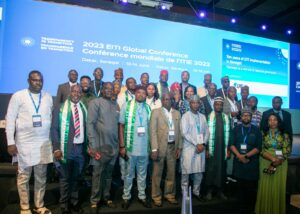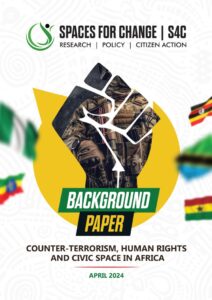Spaces for Change | S4C participated in the 9th Extractive Industries Transparency Initiative (EITI) global conference held in Dakar, Senegal, from June 13-14, 2023. The conference, themed, “Transparency in Transition” brought together over 1,000 attendees from over 50 countries implementing the EITI Standards, comprising government officials, ministries and agencies, civil society organizations, corporations, and international organizations. Over the two days, stakeholders in the extractive industries celebrated the progress made in enhancing transparency in natural resource management and explored new pathways for keeping up with the evolving energy landscape.
The conference also marked the 20th anniversary of the EITI’s establishment and the 10th anniversary of the introduction of the EITI Standards. The EITI has played a crucial role in promoting global responsible governance by establishing clear rules and requirements for disclosure and reporting. In Nigeria, the EITI Standard has inspired policy reforms such as the Nigerian Extractive Industries Transparency Initiative (NEITI) Act which institutionalizes transparency and provides a robust legal framework for effective resource management.
A new Standard was launched at the conference reflecting the changing demands and challenges faced by implementing countries and the growing expectations for transparency and accountability in extractive resource management. The 2023 EITI Standard incorporates energy transition reporting in line with the global push to decarbonize the economy. It requires implementing countries to provide detailed overviews of their energy transition commitments, policies, and plans related to the extractive industries. The Standard also emphasizes the importance of securing minerals necessary for the energy transition while ensuring transparency and accountability in contract-awarding processes.
The new EITI Standard promotes comprehensive community consultation and consent in decision-making processes related to resource extraction, recognizing the rights of indigenous peoples. Indigenous communities living in resource-rich areas often face exclusion and marginalization in decision-making related to resource extraction. Their rights, traditional knowledge, and interests are often ignored, leading to conflicts and grievances. In recognition of indigenous peoples’ right to participate in resource governance, numerous countries have implemented legal and policy reforms incorporating community consultation and consent into their legislative frameworks. An example of such legislation is the right to free, prior, and informed consent which ensures that communities are consulted before undertaking any major resource extraction activity. Despite the progress made, challenges still remain. A major obstacle to achieving meaningful consultation and consent is the power imbalance that exists between communities and extractive industries or governments. A study conducted by Spaces for Change revealed that community engagement between companies and host communities often falls short of meeting international criteria for free, prior, and informed consent.
Spaces for Change shared its experience regarding approaches for bridging the knowledge gap in Nigeria’s extractive communities. In 2022, the organization published the Community-Investor Guidelines designed to heighten awareness of the rights of extractive communities and the duties of investors to their host communities throughout the life-cycle of an extractive project. Armed with the Guideliness, numerous resource-rich communities in Nigeria have been trained and empowered to assert these rights, including executing agreements with investors, and translating the agreements into legally-enforceable obligations.
The new Standard also addresses historical challenges arising from contract transparency in mineral-rich countries during the fossil-fuel era. Partial disclosure of contract information has limited the assessment of contract impact and fairness, leading to corruption and rent-seeking behaviors. The 2023 standard also emphasizes the importance of comprehensive consultative processes between extractive operators, countries, and host communities before awarding oil, gas, or mining licenses.
During the conference, plenary sessions examined the effective implementation strategies for the previous standard and identified potential obstacles to achieving the targets set by the new Standard. Flexibility in implementation was emphasized, allowing countries to prioritize the challenges specific to their context and enhance the relevance of EITI implementation. This collaborative framework involving all stakeholders promotes transparent and accountable natural resource management. Indeed, the EITI Global conference provided a valuable opportunity to celebrate achievements, discuss future strategies, and mutually address the barriers to transparency and accountability in the extractive industries.





















